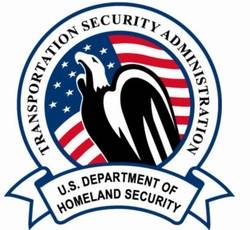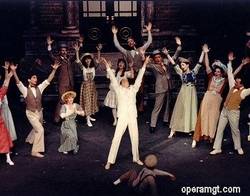TSA Living Up to Expectations
[On this past weekend's flight from Denver, I
couldn't help noticing seven TSA employees, all standing around a
table, talking with each other, while the other 17 TSA-ers (and two
real cops) in the immediate security screening area were "busily"
checking all TWO of the prospective passengers behind me --ANN
News Editor, Tim Kern]
 A newly-released paper, "Terrorized Into
Absurdity," by Independent Institute research fellow Roger Roots,
details how government's knee-jerk reaction to September 11, plus
the militaristic/secret-police mismanagement of the Transportation
Security Administration, has done more harm than good, especially
compared to what could have been a market solution to the perceived
problem.
A newly-released paper, "Terrorized Into
Absurdity," by Independent Institute research fellow Roger Roots,
details how government's knee-jerk reaction to September 11, plus
the militaristic/secret-police mismanagement of the Transportation
Security Administration, has done more harm than good, especially
compared to what could have been a market solution to the perceived
problem.
Roots finds that federalization of airline security will
decrease, not increase, passenger safety. Certainly, the recent
report of the dozens of screeners with criminal background has
something to do with this, but it is also in part due to the civil
service -- "once hired, rarely fired" means that these screeners --
in addition to the tens of thousands who have yet to undergo a
background check -- are here to stay.
Knee jerks have been around a long time.
Roots starts by showing that government action -- immediate,
ineffective, expensive, and permanent -- is not a new "solution" to
society's ills. Throughout the 20th Century, government,
increasingly free of constitutional limits, has behaved this way.
He writes, "Declaration of a national emergency in 1933 facilitated
the creation of a number of colossal government programs that
survived long after the Depression had ended, even if they had done
nothing to end the Depression... A similar climate of hysteria
regarding alleged runaway drug use in the late 1980s prompted
government officials to fill U.S. prisons with casualties of the
war on drugs, but the laws passed in response to that hysteria
produced less-than-satisfactory advances against actual drug
use...
 "Consistent with this pattern, U.S. policymakers
responded to the terrorist suicide hijackings of September 11,
2001, with 'the biggest expansion in federal powers and the most
free-handed new spending of federal dollars in decades.' Congress
and the Bush administration expanded the powers of federal law
enforcement to detect and arrest terrorists, increased U.S.
investments in counterterrorist intelligence, placed thousands of
National Guard troops at airports, and expanded the use of armed
air marshals on domestic flights."
"Consistent with this pattern, U.S. policymakers
responded to the terrorist suicide hijackings of September 11,
2001, with 'the biggest expansion in federal powers and the most
free-handed new spending of federal dollars in decades.' Congress
and the Bush administration expanded the powers of federal law
enforcement to detect and arrest terrorists, increased U.S.
investments in counterterrorist intelligence, placed thousands of
National Guard troops at airports, and expanded the use of armed
air marshals on domestic flights."
He says that's nothing, compared to, "...the creation of a huge
new federal agency, the Transportation Security Administration
(TSA), to perform security screening at U.S. commercial
airports."
Not just ineffective; it's expensive, and hurts other
efforts.
Roots notes that, "The expense of the government screening
operation was estimated initially at $1.8 billion annually but
later increased by $4.4 billion after the TSA had been created. By
comparison, the airlines paid approximately $660 million to
screening firms in 2000. The explosion in funding for the TSA has
enticed hundreds of federal workers to leave other agencies, such
as the Border Patrol and the Secret Service, to take advantage of
the TSA's $36,900 to $83,900 annual pay scale." Their mismanagement
has also resulted in the agency's announcement of upcoming mass
firings, further disruptive of the screeners' lives and
careers.
 Roots
continues, documenting the research on what "Professor" Harold Hill
(The Music Man) called, "Mass-teria" [Roots uses the
more-academic term, "moral panic" --ed.], and its effects on
rational policy-making: "Passage of the Aviation and Transportation
Security Act exemplified policymaking at its worst: frenzied,
panicked, and overreactionary."
Roots
continues, documenting the research on what "Professor" Harold Hill
(The Music Man) called, "Mass-teria" [Roots uses the
more-academic term, "moral panic" --ed.], and its effects on
rational policy-making: "Passage of the Aviation and Transportation
Security Act exemplified policymaking at its worst: frenzied,
panicked, and overreactionary."
Praise for FAA, PAX
Roots notes that on September 11, the FAA did many right things,
such as the unprecedented grounding of all flights; the
passengers on Flight 93, illegally using cell phones, were
able to thwart the fourth attempt. These examples of correct
responses to a problem are in sharp contrast to the over-reaction
of the TSA and its formation. He notes, "From a passenger pool of
only approximately thirty people—without weapons, training,
or instruction -— sufficient resistance arose to prevent the
hijackers from accomplishing their ultimate objective."
He also brings up the most-important item, overlooked by the
federalize-frenzy in the wake of September 11: "Viewed from the
most practical perspective, the September 11 hijackings were caused
not by the failure of screeners on the ground but by
failures of airline personnel in the
air, who were inadequately equipped to defend the cockpits."
In his conclusion, Roger Roots notes, "The damage done to the
future of the air-travel industry by Congress’s acts may
exceed the damage done to the industry by the terrorists
themselves."
What we're saying is, for those with the time and the interest,
it's a good read.
 Aero-News: Quote of the Day (12.09.25)
Aero-News: Quote of the Day (12.09.25) ANN's Daily Aero-Term (12.09.25): High Speed Taxiway
ANN's Daily Aero-Term (12.09.25): High Speed Taxiway ANN's Daily Aero-Linx (12.09.25)
ANN's Daily Aero-Linx (12.09.25) NTSB Final Report: Diamond Aircraft Ind Inc DA20C1 (A1); Robinson Helicopter R44
NTSB Final Report: Diamond Aircraft Ind Inc DA20C1 (A1); Robinson Helicopter R44 ANN FAQ: Q&A 101
ANN FAQ: Q&A 101





